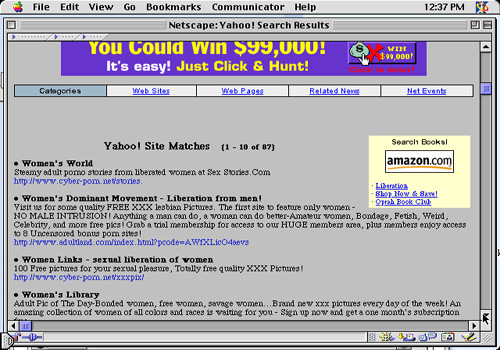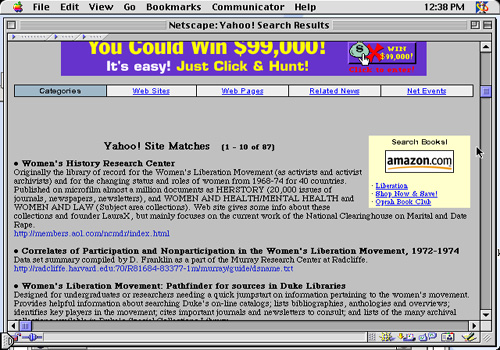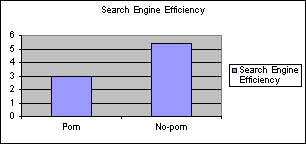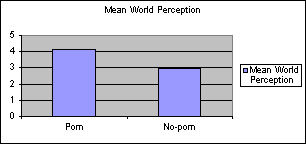Media Effects Research Lab - Research Archive
Priming effects of accidental exposure to internet pornography:
Student Researcher(s)
Sriram Kalyanaraman (Ph.D Candidate);
Chad Mahood (Masters Candidate);
Faculty Supervisor
FOR A COMPLETE REPORT OF THIS RESEARCH, SEE:
Kalyanaraman, S., Mahood, C., Sundar, S. S., & Oliver, M. B. (2000, August). Priming effects of accidental exposure to internet pornography: An experimental study of construct accessibility in search engine output. Paper presented to the Communication Technology and Policy Division at the 83rd annual convention of the Association for Education in Journalism and Mass Communication (AEJMC), Phoenix, AZ.
INTRODUCTION
Given the number of Websites on the WWW, many Web developers engage in a practice called spamdexing -- doctoring a Web page to fool search engines into putting it high on a list of search results. Pornography Website developers are particularly guilty of this practice, as even a seemingly innocuous search term such as "pre-teen" can result in a list containing explicit pornographic sites. Another prominent device used by Web designers, particularly in the pornography industry, refers to a practice known as mousetrapping -- disabling the Back button on a Web browser to prevent users from escaping the site. When a user is caught in such a trap, he/she might try to escape the page by closing the window, but this often results in another "pop-up" window in its place, thus preventing the mouse from escaping. Thus, using the Web as an informational tool requires a tolerance for unexpected--and unavoidable--pornographic material. The preceding discussion is representative of issues related to Internet pornography and search engines. Curiously, the bulk of the debate in this area is fundamentally premised on the assumption that Internet pornography has lasting psychological effects. There appears to be a dominant conviction that exposure to pornography on the Internet, however incidental, will have detrimental effects. However, there is very little empirical evidence to verify such assumptions of media effects in the context of the Internet. The present investigation attempts to make a modest contribution in this direction by empirically investigating the psychological effects of accidental exposure to pornography (or at least a description of it) in the most common of all cyber venues: the search engine
Specifically, we were interested in examining the following questions: Will participants make judgments about the prevalence of Internet pornography based on the results of a search query?
Will the presence of unexpected search results lead to negative perceptions of the search engine? Will participants tend to negatively perceive people, and events, in the real world based on the results of their search query?
HYPOTHESES
H1a: Participants accidentally exposed to descriptions of pornographic Websites after submitting a search term will have more negative impressions of Internet pornography than those participants exposed to descriptions of non-pornographic Websites.
H1b: Participants accidentally exposed to pornographic descriptions will rate the Internet as having a higher percentage of pornographic Websites than those participants exposed to non-pornographic descriptions.
H2: Participants accidentally exposed to pornographic descriptions upon submitting a search term unrelated to pornography will evince greater negative impressions of the search engine than those participants who are exposed to non-pornographic descriptions upon submitting the same search term.
H3: Participants accidentally exposed to descriptions of pornographic Websites will have significantly higher negative perceptions of the world, and people, in general, compared to those participants exposed to non-pornographic descriptions.
METHOD
Ninety-three participants in a between-participants experiment were randomly assigned to one of three experimental conditions. Both male and female participants were exposed to one of three versions of a search engine Website, manipulated to display either "No," "Moderate," or "High" number of pornography-related search results. After participants were exposed to the search results, their evaluation of the search engine as well as their perceptions of Internet pornography and social reality were measured through a series of questions administered via a paper-and-pencil questionnaire.


RESULTS
One way analyses of variance revealed that although most of the results were in the hypothesized direction, some of the findings did not exhibit a statistically significant difference between "high" and "moderate" porn conditions. Perhaps, this can be attributed to the fact that even the presence of a few descriptions can prime thoughts related to that concept. The general trend suggests that the data can be interpreted better when both the medium and high pornography conditions are combined. Such a combination also affords a more robust explanation for priming and accessibility effects, since the differences are now restricted solely to "Primed" (Porn) versus "Non-primed" (No-porn). Like before, we performed a series of analyses to test for significance between the two conditions.
H1a: Supported. Participants in the porn condition had a significantly greater negative perceptions of Internet pornography than did those participants in the no-porn condition.
H1b: Supported. Participants in the porn condition estimated a significantly higher percentage of pornographic Websites as existing on the Internet compared to participants in the no-porn condition.

H2: Supported. Participants who were exposed to no pornographic descriptions rated the search engine as significantly more efficient than participants who were exposed to pornographic descriptions.
.jpg)
H3: Supported. Specifically, participants in the porn condition rated the world to be significantly meaner than did participants in the no-porn condition.

CONCLUSION
Results of this study suggest that even some exposure to Internet pornography (in this case, a description of Websites as a result of search engine manipulation) results in significantly more negative perceptions of not only Internet pornography, but also the Internet in general, as evidenced by the tendency among participants in the porn conditions to rate the search engine less favorably (particularly less efficient) than participants in the no-porn condition. The overall findings reported here offer strong evidence for priming effects and the operation of construct accessibility. Thus, even a simple manipulation of Website content can have profound theoretical, psychological, and policy consequences.
For more details regarding the study contact
Dr. S. Shyam Sundar by e-mail at sss12@psu.edu or by telephone at (814) 865-2173

